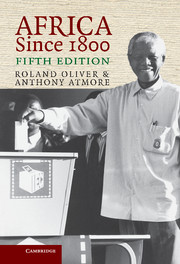Book contents
- Frontmatter
- Contents
- List of Maps
- ONE AFRICA NORTH OF THE EQUATOR
- TWO AFRICA SOUTH OF THE EQUATOR
- THREE THE OPENING UP OF AFRICA: (1) FROM THE NORTH-EAST
- FOUR THE OPENING UP OF AFRICA: (2) FROM THE MAGHRIB
- FIVE WEST AFRICA BEFORE THE COLONIAL PERIOD, 1800–1875
- SIX WESTERN CENTRAL AFRICA, 1800–1880
- SEVEN EASTERN CENTRAL AFRICA, 1800–1884
- EIGHT SOUTHERN AFRICA, 1800–1885
- NINE THE PARTITION OF AFRICA ON PAPER, 1879–1891
- TEN THE PARTITION OF AFRICA ON THE GROUND, 1891–1901
- ELEVEN COLONIAL RULE IN TROPICAL AFRICA: (1) POLITICAL AND ECONOMIC DEVELOPMENTS, 1885–1914
- TWELVE COLONIAL RULE IN TROPICAL AFRICA: (2) SOCIAL AND RELIGIOUS DEVELOPMENTS
- THIRTEEN THE INTER-WAR PERIOD, 1918–1938
- FOURTEEN NORTH AND NORTH-EAST AFRICA, 1900–1939
- FIFTEEN SOUTH AFRICA, 1902–1939
- SIXTEEN THE LAST YEARS OF COLONIAL RULE
- SEVENTEEN THE ROAD TO INDEPENDENCE: (1) NORTH AND NORTH-EAST AFRICA
- EIGHTEEN THE ROAD TO INDEPENDENCE: (2) AFRICA FROM THE SAHARA TO THE ZAMBEZI
- NINETEEN THE ROAD TO INDEPENDENCE: (3) CENTRAL AFRICA
- TWENTY THE LONG ROAD TO DEMOCRACY IN SOUTHERN AFRICA
- TWENTY ONE THE POLITICS OF INDEPENDENT AFRICA
- TWENTY TWO ECONOMICS AND SOCIETY IN INDEPENDENT AFRICA
- TWENTY THREE INTO THE THIRD MILLENNIUM
- EPILOGUE
- Suggestions for Further Reading
- Index
EIGHTEEN - THE ROAD TO INDEPENDENCE: (2) AFRICA FROM THE SAHARA TO THE ZAMBEZI
Published online by Cambridge University Press: 05 June 2012
- Frontmatter
- Contents
- List of Maps
- ONE AFRICA NORTH OF THE EQUATOR
- TWO AFRICA SOUTH OF THE EQUATOR
- THREE THE OPENING UP OF AFRICA: (1) FROM THE NORTH-EAST
- FOUR THE OPENING UP OF AFRICA: (2) FROM THE MAGHRIB
- FIVE WEST AFRICA BEFORE THE COLONIAL PERIOD, 1800–1875
- SIX WESTERN CENTRAL AFRICA, 1800–1880
- SEVEN EASTERN CENTRAL AFRICA, 1800–1884
- EIGHT SOUTHERN AFRICA, 1800–1885
- NINE THE PARTITION OF AFRICA ON PAPER, 1879–1891
- TEN THE PARTITION OF AFRICA ON THE GROUND, 1891–1901
- ELEVEN COLONIAL RULE IN TROPICAL AFRICA: (1) POLITICAL AND ECONOMIC DEVELOPMENTS, 1885–1914
- TWELVE COLONIAL RULE IN TROPICAL AFRICA: (2) SOCIAL AND RELIGIOUS DEVELOPMENTS
- THIRTEEN THE INTER-WAR PERIOD, 1918–1938
- FOURTEEN NORTH AND NORTH-EAST AFRICA, 1900–1939
- FIFTEEN SOUTH AFRICA, 1902–1939
- SIXTEEN THE LAST YEARS OF COLONIAL RULE
- SEVENTEEN THE ROAD TO INDEPENDENCE: (1) NORTH AND NORTH-EAST AFRICA
- EIGHTEEN THE ROAD TO INDEPENDENCE: (2) AFRICA FROM THE SAHARA TO THE ZAMBEZI
- NINETEEN THE ROAD TO INDEPENDENCE: (3) CENTRAL AFRICA
- TWENTY THE LONG ROAD TO DEMOCRACY IN SOUTHERN AFRICA
- TWENTY ONE THE POLITICS OF INDEPENDENT AFRICA
- TWENTY TWO ECONOMICS AND SOCIETY IN INDEPENDENT AFRICA
- TWENTY THREE INTO THE THIRD MILLENNIUM
- EPILOGUE
- Suggestions for Further Reading
- Index
Summary
The roots of Black African nationalism reach in many directions back into history. One powerful impulse was the growing ethnic awareness of the descendants of the African slaves in the New World, which was proclaimed by activists such as Marcus Garvey with his slogan ‘Africa for the Africans’, and Edward Blyden, who settled in Liberia in 1850, with his idea of the African personality. Even more influential was the Pan–Africanist doctrine of William DuBois, who organised Pan–African Congresses in the 1920s and 1930s. Many Africans from British colonies who were studying in Britain and the United States were caught up in the excitement of these ideas and schemes. Another powerful strand in the web of African nationalism was that stemming from European socialism and communism, which, especially after the Russian Revolution, were vehement in denouncing the colonial system. Africans who went to Europe discovered in socialism, and in particular in Marxist communism, techniques of political action which appeared well suited to their needs, a call to heroism in a world struggle, and a promise of future freedom and prosperity. And in Europe, of course, there was the pervasive and heady example of nationalism in practice, an example which was already spreading through colonial lands in Asia like wildfire.
To see how these complex strands were woven together to produce the political activity that resulted in independence, we can look for an example at the early career of Kwame Nkrumah, which is so well told in his autobiography, Ghana.
- Type
- Chapter
- Information
- Africa since 1800 , pp. 244 - 266Publisher: Cambridge University PressPrint publication year: 2005



